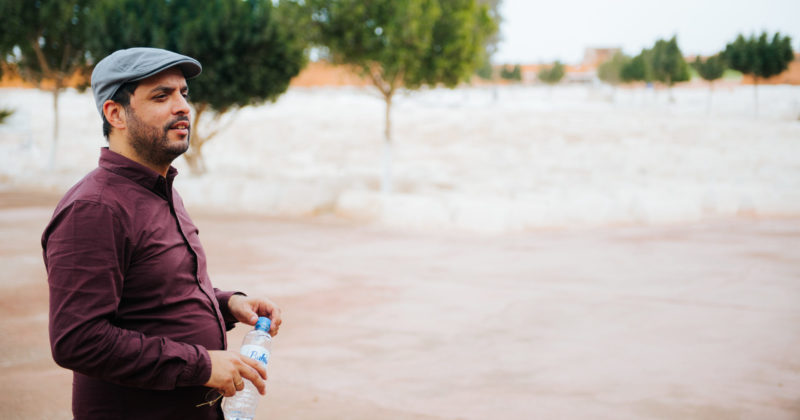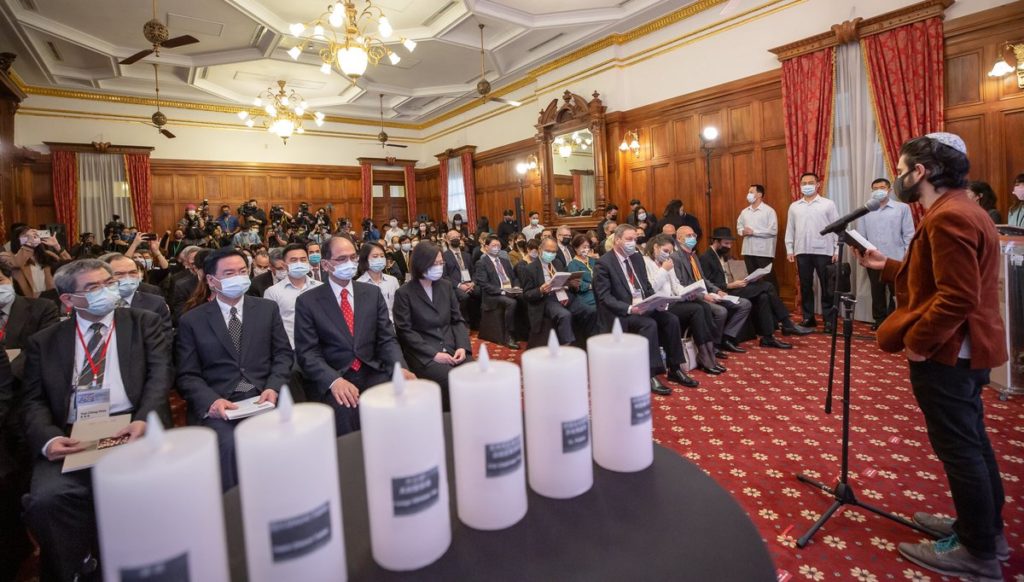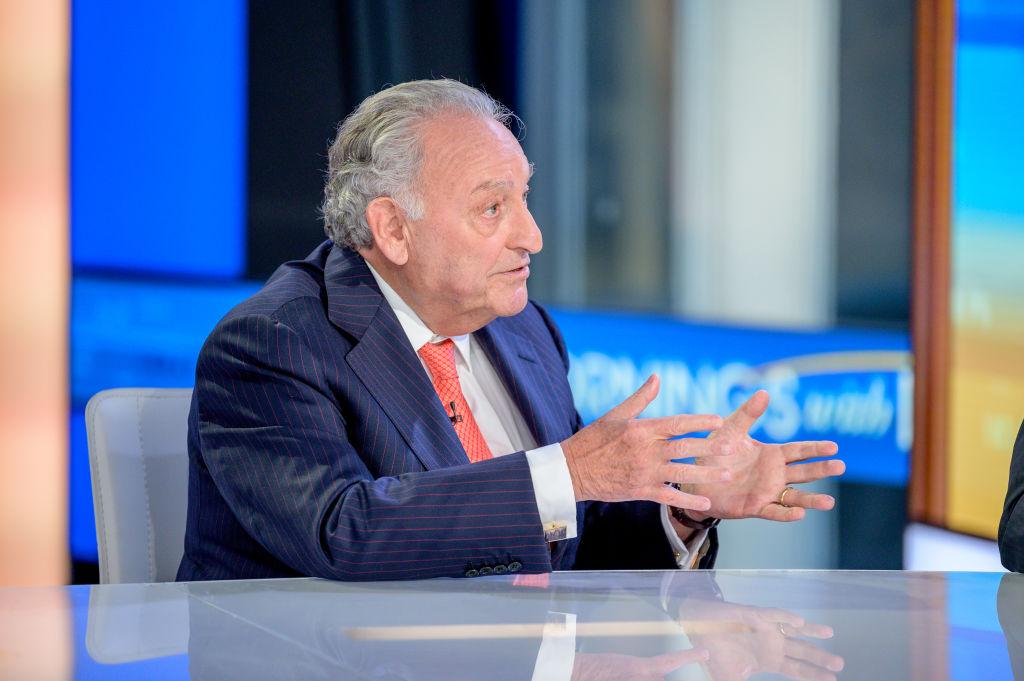Your Daily Phil: Jewish Kharkiv student killed in Ukraine + Preserving Morocco’s Jewish heritage
Good Wednesday morning!
Ed. note: In celebration of Purim, the next edition of Your Daily Phil will arrive on Friday.
On Feb. 23, one day before Russian troops invaded Ukraine, Serafim Sabaranskiy bought combat gear and army boots. He was sure that the war would start, and wanted to be ready to fight for his city, Kharkiv. This week, Sabaranskiy, a Jewish student born in 1993, was killed by a Russian airstrike on Kharkiv as he served in a territorial defense unit, according to Yulia Potoskaya, the director of the Kharkiv Hillel.
Sabaranskiy’s death is the most painful loss yet for Kharkiv’s Hillel community, Potoskaya told eJewishPhilanthropyon Tuesday. She and others who knew Sabaranskiy — who was nicknamed “Red” for the color of his thick hair — recalled him as an energetic, funny and independent man dedicated to his community and his city. In a Facebook post, Kharkiv Hillel called him a “brave, brave man with a big heart.”
“He was a very strong man,” Potoskaya, who also relayed the details of his combat service and death, told eJP. “Nobody could tell him what to do, and he decided to go to the army. It was his decision.”
In a video of Sabaranskiy taken before he was killed that Potoskaya shared with eJP, he smiles at the camera dressed in full battle gear. He mocks Russian President Vladimir Putin’s claim that Russia’s fight in Ukraine is against Nazis, mentioning his own Jewish family and his travels to Israel. He says, “We’re not at war with the Russian people, we’re at war with Putin.”
“We love our home,” he said. “Get out of here with your weapons and come drink vodka with us.”
Potoskaya said Sabaranskiy was “very funny, smiling all the time” and was a frequent volunteer at the city’s Hillel who enjoyed Shabbat programming, cycling and travel, and went on a Birthright trip to Israel in 2019.
Sabaranskiy was not the only Hillel student to volunteer for duty, Potoskaya said. She’s now trying to assist community members in Kharkiv who have both left and stayed — helping them find food, shelter, money or a way out. And she’s dreading hearing that another student has been killed at the front.
“When the war started, I knew that a lot of guys would go to war,” she said. “Of course it’s a war and I understand that. I’m very worried but I understand. He was first, but unfortunately if it will not finish immediately, it could be more.”
CULTURAL EXCHANGE
Meet the Israeli working to revive and preserve Morocco’s Jewish heritage


With expert ease, Kobi Ifrach navigates the narrow alleyways of the Mellah, Marrakesh’s old Jewish quarter, ruffling the heads of small children and greeting stall owners selling tea and spices in the market, as if he’s lived here his entire life. But, despite his Mediterranean complexion and fluent Moroccan tongue, Ifrach did not grow up here. In fact, he was born and raised thousands of miles away in the small, dusty town of Dimona – in Israel. “All my life, I heard about Morocco and listened to stories about Morocco,” Ifrach, 39, told Jewish Insider’s Ruth Marks Eglash.
Homecoming: A child of immigrants – his father arrived in Israel from Fez, his mother from Marrakesh – who spoke Moroccan Arabic at home, Ifrach said he always felt like somewhat of an outsider in Israel. “Even though I grew up in Dimona, lived in Jerusalem, Tel Aviv and other places in Israel, there was always something in my culture, in my traditions that made me feel different,” he continued, explaining what prompted him to first visit Morocco in a pre-army trip at 18. He eventually obtained Moroccan citizenship and moved to his mother’s hometown permanently approximately five years ago. “When I arrived here, I felt like I had returned home,” stated Ifrach, who, with his partner, went on to create Kulna, a nonprofit organization aimed at preserving and promoting Jewish Moroccan heritage in both Morocco and Israel.
Teaching history: Among the projects in his new home country, Ifrach has helped to build a museum dedicated to the Jews of Marrakesh, renovate the Jewish cemetery, and create study programs for young Israelis interested in learning about Moroccan Jewish life and culture. In all, he has brought more than 1,000 people to the Arab country to experience, in person, Morocco’s 2,000-year-old Jewish history. “Morocco is the land of longing, not only for Jews of Moroccan heritage but for all Jews, regardless of their roots, and it’s the only place where you can touch and feel Jewish history that has been here for thousands of years,” he told JI during a recent interview at the Leaders of Tomorrow Summit, organized by Tel Aviv-based NGO Israel-is and the Mimouna Association, a Moroccan nonprofit that promotes and preserves Jewish heritage in Morocco.
Long relationship: “Morocco is a special place because it is the only Arab country, maybe even the only country in the world, that has had an active Jewish community for so long,” David Biton, head of Jewish studies at Ono Academic College in Israel and an expert on the Moroccan Jewish community, told JI. “The community’s influence on the economy and the culture is amazing given its size, and although there are other Muslim countries such as Turkey and Iran that have Jewish communities, there is no Arab country like this.”
Purim politics
The problem with kings (Purim 5782)


Shutterstock
“The synagogue of ‘El Tránsito’ in Toledo, Spain, is among the oldest and most beautiful in the world, with a sanctuary displaying magnificent Moorish decorations and gorgeous Hebrew inscriptions. Among the verses and invocations, three words are the largest and most ornamented: ‘HaMelekh Don Pedro’ (The King Don Pedro)… Toledo’s Jews were not alone in their obsequiousness to the reigning monarch,” writes Andrés Spokoiny, president and CEO of Jewish Funders Network, in an opinion piece for eJewishPhilanthropy.
Purim, exhibit one: “But this proximity to kings never protected Jews for long. The story of Purim is exhibit one. Persia’s King Ahasuerus wasn’t particularly anti-Jewish. He descended from those Persian monarchs who had let the Jews resettle in Israel and rebuild the Temple after the Babylonian exile. He was delighted with his new Jewish queen, Esther, and until Haman appeared in the picture seemed fairly benevolent towards our kind. And yet, he had no qualms turning against the Jews and validating their massacre.”
An absence of checks and balances: “What’s really terrifying about the Purim story – and about the medieval kings turning on the Jews – is the capriciousness of it. Ahasuerus didn’t care about the Jews one way or another, but Haman promised him some loot and a good excuse for a feast, so why not? There was no rule of law, no checks and balances, no independent courts, no free press to criticize the move. In other words: In a liberal democracy, the Purim story couldn’t have happened.”
Endangered democracy: “It should be unnecessary for Jews – or anybody for that matter – to enumerate the advantages of democracy over dictatorship. And yet, in our times, democracy is endangered by the seemingly irresistible allure of totalitarianism. It seems that every time we experience uncertainty or instability, we start looking with nostalgia to the protection of the autocrat.”
PURIM, THEN AND NOW
Where have the people gone?


iStock
“As I begin my Purim preparations this year, I find myself reflecting back to Purim in March 2020, when our communal fabric ruptured radically. In the moment, it was hard to appreciate the profound impact that the abrupt severing of our in-person gatherings would have on our collective human experience,” writes Jennifer Sultan, a health company business strategy director, in an opinion piece for eJewishPhilanthropy.
Time, and COVID, march on: “Spring 2020 flowed into summer and the acute-crisis stage of the COVID-19 pandemic gave way to the unprecedented highs, lows and twists and turns of the second half of 2020 and through 2021. Similarly, collective activism and highly engaged remote communities of March 2020 devolved into Zoom fatigue and ever-increasing frustration with ping-ponging policies and an opaque path forward. The uncertainty that followed the acute crisis stage of 2020 ultimately engendered deep schisms and hyper-polarization in society at-large. Our own local communities reflected these broader trends.”
The growth of echo chambers: “As the world outside became louder, individuals retreated further – if not into their homes, then towards echo chambers of highly polarized communities. As we collectively held our breath for the other shoe to drop, conversational curiosity all but evaporated in such a highly charged world. Existential exhaustion replaced our collective activism.”
Remarkably unremarkable: “Entering a synagogue in 2022, superficially, the experience appears unchanged: The liturgy, the service, the speeches remain remarkably unremarkable – untouched by the radical re-definition of communal engagement thrust upon us so abruptly in March 2020.”
Worthy Reads
Making Local Journalism: Three East Hollywood millennials — Samanta Helou Hernandez, a freelance journalist; Jimmy Recinos, a middle school English teacher; and Ali Rachel Pearl, a postdoctoral fellow at the University of Southern California — are taking a grassroots approach to local journalism, writes Gustavo Arellano in the Los Angeles Times, founding the local paid Substack newsletter “Making a Neighborhood.” “Their immediate goal is modest: 1,000 paying subscribers (there’s a free option that gets cheapskates one post a month). But Helou, Pearl and Recinos want to make enough money to not just pay themselves but also to commission freelancers in East Hollywood to tell their own stories. And the biggest dream? Inspire activists and residents in other neighborhoods to start their own paid newsletters. ‘If people are informed, then they could feel more in control, because information is power,’ Helou said.” [LATimes]
Let the Sun Shine: The Senate unanimously approved a bipartisan bill that would make Daylight Saving Time permanent across the United States next year, Farnoush Amiri writes in the Associated Press: “The bipartisan bill, named the Sunshine Protection Act, would ensure Americans would no longer have to change their clocks twice a year. But the bill still needs approval from the House, and the signature of President Joe Biden, to become law…Members of Congress have long been interested in the potential benefits and costs of daylight saving time since it was first adopted as a wartime measure in 1942. The proposal will now go to the House, where the Energy and Commerce Committee had a hearing to discuss possible legislation last week.” (Agudath Israel of America has issued a statement expressing its concerns about the bill, which, the Orthodox organization says, could endanger children going to school and would make gathering for morning prayers more difficult for Jews.) [AP]
Community Comms
Excel: Applications now being accepted for Spertus Institute’s accelerated Master’s program for Jewish communal executives. Complete your degree in 18 months.
Be featured: Email us to inform the eJP readership of your upcoming event, job opening, or other communication.
Word on the Street
Twenty-eight Jewish groups, led by the Conference of Presidents of Major American Jewish Organizations, called on the Biden administration to accelerate the acceptance of Ukrainian refugees into the United States…
A Chabad yeshiva in Kharkiv, Ukraine that is housed in a historic synagogue sustained a direct hit from Russian rocket fire on Tuesday. No one was injured.
The U.K. Foreign Office has imposed sanctions on 370 Russian and Belarusian individuals with alleged links to Russian President Vladimir Putin, including billionaires who have made significant donations to Jewish communal organizations. Among the names on the new list are Mikhail Fridman, Pyotr Aven and German Khan – co-founders of the Genesis Philanthropy Group…
The International Youth Meeting Centre in Oswiecim, Poland, a youth education center near Auschwitz, has opened its doors to refugees fleeing Ukraine…
Randall J. Fried was named director of philanthropic engagement and communication at Tzedek America, a Jewish service learning organization; he previously served as director of membership engagement at Wilshire Boulevard Temple in Los Angeles, and director of West Coast development at Laniado Development Fund …
??Israel’s fintech sector saw a significant funding boom in 2021, with investments in fintech startups and companies reaching $4.5 billion, according to a report published this week by Israeli investment firm Viola Group. That figure marked a 136% increase from 2020, which saw $1.9 billion in funding, according to the study…
The Jewish Museum has been awarded a grant of $150,000 from The Andrew W. Mellon Foundation in support of a wide range of arts programs, virtual and in-person, serving people with memory loss…
The Massachusetts Institute of Technology received a founding gift of $100 million from the Morningside Foundation, the philanthropic arm of the T.H. Chan family, to establish an interdisciplinary center…
The University of Oxford announced a $32.6 million gift from Stephen A. Schwarzman in support of the humanities center that he helped establish in 2019…
With an initial $90 million in funding, The Novo Nordisk Foundation, Open Philanthropy and the Bill & Melinda Gates Foundation launched an initiative designed to support new antiviral medicines for future pandemics…
After being impacted by COVID-19 for two years running, Melbourne’s In One Voice festival is back on, showcasing and celebrating the culture, food, and talent of Melbourne’s Jewish community.
Pic of the Day


Twitter/President of the Republic of China (Taiwan)
Members of Taiwan’s Jewish and diplomatic communities gathered Tuesday to remember the victims of the Holocaust.
Birthdays


Roy Rochlin/Getty Images
Former CEO and chairman of Citigroup, Sanford I. “Sandy” Weill…
Dean and founder of the Los Angeles-based Simon Wiesenthal Center and its Museum of Tolerance, Rabbi Marvin Hier… NYC tax attorney and litigator, he served as a tax assistant to the solicitor general of the U.S., Stuart A. Smith… Actress and film director, Susan Linda Bay Nimoy… Computer scientist and professor emeritus at the Vrije Universiteit Amsterdam in the Netherlands, Andrew S. Tanenbaum… Israeli singer, best known as the original singer of “Jerusalem of Gold,” Shulamit “Shuli” Natan… Actor and singer, Victor Garber… Customer service associate at Jewish Free Loan Association of Los Angeles, Judy Karta… Mathematician, technology innovator (with 260 patents) and founder of four technology companies, he is the creator of the first camera phone, Philippe Kahn… Peabody Award- and Emmy Award-winning NPR journalist since 1977, now a host of NPR’s “Weekend Edition Saturday,” Scott Simon… VP of external affairs and government relations at the Jewish Federation of Cleveland, Amy Reich Kaplan… Film producer, production designer and adjunct faculty member at Chicago’s Columbia College, Gail Sonnenfeld… Adjunct professor at both George Washington University Law School and Stanford In Washington, Andrew D. Eskin… U.S. deputy secretary of transportation, Polly Ellen Trottenberg… VP for talent, booking at Disney / ABC Television Group, Eric Avram… President of the Ruderman Family Foundation, Jay Ruderman… Actor and comedian, best known for playing the role of writer Frank Rossitano on the NBC sitcom “30 Rock,” Judah Friedlander… Senior producer of “The Last Word with Lawrence O’Donnell” at MSNBC, Amy Shuster… Co-head of the financial services practice at the BGR Group, Andy Lewin… Speechwriter for President Joe Biden at The White House, Jeff Nussbaum… Co-founder of Chochmat Nashim, Shoshanna Keats Jaskoll… President and managing director at SKDKnickerbocker Digital, Jason Rosenbaum… Winemaker at Covenant Wines and Hajdu Wines, Jonathan Hajdu… Retired soccer player in the Israeli Premier League who is now the first team manager of Maccabi Tel Aviv, Yoav Ziv… Detroit-based founder and managing partner of Ludlow Ventures, Jonathon Triest… Head of policy and communications at Facebook’s Israel office, she was previously chief of staff at the Israeli embassy in Washington, Jordana Cutler… Managing director at Finsbury Glover Hering, Adam Blickstein… Director of global corporate partnerships at Global Citizen, Alexandra Stabler… Pulitzer Prize-winning investigative reporter on the Metro desk of The New York Times, Brian M. Rosenthal… Director in the New York office of the Jewish National Fund, Sarah Azizi… First baseman for MLB’s Milwaukee Brewers, Ryan John “Rowdy” Tellez… Third-year student at the University of Michigan Law School, Nathan Bennett… Scholar in residence at Shalom Hartman Institute of North America, Mijal Bitton… Director of faculty and senior fellow at Shalom Hartman Institute of North America, Elana Stein Hain…Jackie Stern… Jeremy Levin…








